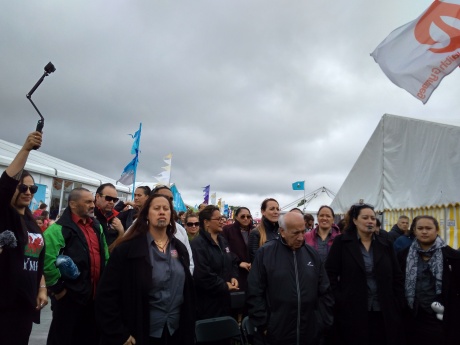Māori language advocates and activists from the Te Panekiretanga o te Reo group (School for Language Excellence) from Aotearoa-New Zealand visted the Urdd Eisteddfod today (Tuesday 30th May) as a part of their study trip visiting lesser spoken language communities across western Europe.
The group of 40 will visit Scotland, Ireland and the Basque Country as a part of their trip, meeting with a number of different language groups in those communities. The group performed a Haka, a traditional spoken word and dance performance, that was composed especially for this visit, outside the Cymdeithas yr Iaith Gymraeg stand on the Urdd Eisteddfod field.
Timoti Karetu, one of the founders of the Te Panekiretanga o te Reo school and organiser of the visit said,
“The reason for our being here is to observe other people who, like us, are committed to the survival of their indigenous languages. Welsh language campaigners have long been in the vanguard of the movement of which we are a part so it is only right that we should come here to observe and then to put those ideas into action when we return home. Perhaps we might have experiences and ideas you would like to adopt as well. It’s important that we as communities of smaller languages share knowledge and learn from each other.”
This visit is a part of a wider effort by Cymdeithas yr Iaith to collaborate with international language activists to support and share information about good practices in order to contribute towards a healthier future for smaller languages.
Tomos Jones, International Officer for Welsh language campaign group Cymdeithas yr Iaith said:
“Co-operating and sharing information with international language activists is extremely important to Cymdeithas. The constant battle to ensure a sustainable future for the Welsh language is a battle that is common to many language communities around the world. Through unity and cooperation with our international friends it’s possible to learn and also come to a realisation, that we are all battling together - we are not alone in the movement to ensure recognition and justice for our languages. We cannot rely on others to achieve this goal, but campaign with each other to ensure a prosperous future to the variety of world languages, including the Welsh language.”
